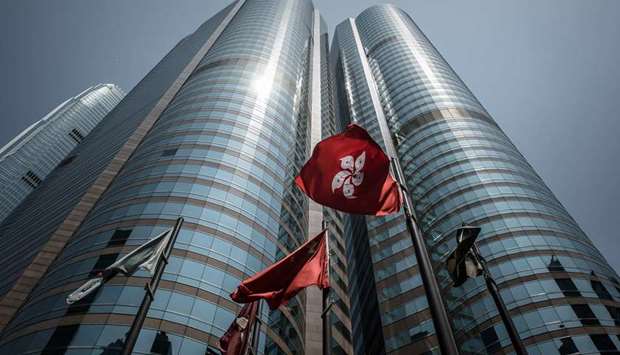Hong Kong led a sell-off across world equities yesterday after China introduced proposals to enact a national security law for the city, fanning geopolitical tensions and overshadowing optimism about a further easing of virus lockdowns across Europe and the US.
After months of concentrating on the economic impact of the coronavirus, traders’ attention flipped back to China-US tensions, already exacerbated by Donald Trump’s constant criticism of Beijing’s handling of the pandemic.
On the first day of its rubber-stamp parliament, China unveiled proposals to strengthen “enforcement mechanisms” in Hong Kong, after the city was rocked last year by seven months of massive — and sometimes violent — pro-democracy protests.
The plans sparked warnings of “the end of Hong Kong” and fears of more of the unrest that crippled the city’s economy before the coronavirus struck.
There was also criticism from Washington, with the State Department saying the move would be “highly destabilising, and would be met with strong condemnation from the United States and the international community”. Shares in Hong Kong sank more than 5%, with financials and property firms battered as investors fretted about the city’s economic future.
“Riots in the street and plummeting real estate markets might be the least of Hong Kong’s building wall of worry as this authoritarian national security plan will most certainly bring into question (the city’s) status as a global banking centre,” said Stephen Innes of AxiCorp.
US lawmakers have already passed legislation that would strip the city’s preferential trading status in the United States if it no longer enjoys autonomy from the mainland.
“The geopolitical risks are meaningful,” David Riley, chief investment strategist at BlueBay Asset Management LLP said on Bloomberg TV. “It’s a concern for the market, and is a potential source of weakness and a correction.”
And OANDA’s Jeffrey Halley added: “The very real threat now is the return of mass protests to the streets of Hong Kong, a downgrade in trade status with the US and potentially an exit of large companies.
Overhanging this, are concerns that China and the United States are about to engage in a new round of trade wars.”
Losses elsewhere in Asia were shallower than in Hong Kong.
Tokyo fell 0.8%, while Shanghai, Seoul, Taipei, Bangkok, Manila and Mumbai dropped more than 1%. Singapore shed 2.3% and Sydney was 1% off, while Wellington dropped 0.6%.
The Chinese congress also saw leaders make the rare move of not setting an annual growth target this year owing to the virus crisis, with Premier Li Keqiang saying that Beijing will “give priority to stabilising employment and ensuring living standards”.
Concerns about China-US tensions took away from news that more countries were edging out of virus lockdowns after new deaths and infections eased and observers said the worst of the pain for the global economy may have passed.
Still, the US reported another 2.43mn workers applied for unemployment benefits last week, bringing the total of newly jobless since the shutdowns began in mid-March to 38.6mn.
The fresh uncertainty also weighed on oil prices.
WTI was off more than 6%, with profit-taking also playing a part after weeks of strong gains.
Both main contracts were above $30 per barrel however, thanks to a huge cut in output by key producers and on hopes for increased demand as lockdowns are lifted.
In Tokyo, the Nikkei 225 closed down 0.8% to 20,388.16 points; Hong Kong — Hang Seng ended down 5.6% to 22,930.14 points and Shanghai — Composite closed down 1.9% to 2,813.77 points yesterday.

An external view of the Hong Kong Stock Exchange. The Hang Seng closed down 5.6% to 22,930.14 points yesterday.
